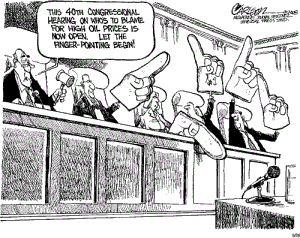 While various parts of the private economy are vilified, sued and other wise pursued for their part in the meltdown of the American economy, perhaps the biggest sinner of all is attempting to walk away unscathed and maybe pulling it off.
While various parts of the private economy are vilified, sued and other wise pursued for their part in the meltdown of the American economy, perhaps the biggest sinner of all is attempting to walk away unscathed and maybe pulling it off.
I’m talking about the Congress of the United States.
Peter Wallison has an interesting Op-Ed in the WSJ today in which he points out that the largest loss to the taxpayers from the various bailouts is almost certainly going to come from the failures of Fannie Mae (FNM) and Freddie Mac (FRE). Something on the order of $400 million.
More to the point, he demonstrates that this need not have happened:
One chapter in this story took place in July 2005, when the Senate Banking Committee, then controlled by the Republicans, adopted tough regulatory legislation for the GSEs on a party-line vote—all Republicans in favor, all Democrats opposed. The bill would have established a new regulator for Fannie and Freddie and given it authority to ensure that they maintained adequate capital, properly managed their interest rate risk, had adequate liquidity and reserves, and controlled their asset and investment portfolio growth.
These authorities were necessary to control the GSEs’ risk-taking, but opposition by Fannie and Freddie—then the most politically powerful firms in the country—had consistently prevented reform.
The date of the Senate Banking Committee’s action is important. It was in 2005 that the GSEs—which had been acquiring increasing numbers of subprime and Alt-A loans for many years in order to meet their HUD-imposed affordable housing requirements—accelerated the purchases that led to their 2008 insolvency. If legislation along the lines of the Senate committee’s bill had been enacted in that year, many if not all the losses that Fannie and Freddie have suffered, and will suffer in the future, might have been avoided.
Why was there no action in the full Senate? As most Americans know today, it takes 60 votes to cut off debate in the Senate, and the Republicans had only 55. To close debate and proceed to the enactment of the committee-passed bill, the Republicans needed five Democrats to vote with them. But in a 45 member Democratic caucus that included Barack Obama and the current Senate Banking Chairman Christopher Dodd (D., Conn.), these votes could not be found.
Have we been favored with one word of apology? Of course not. Moreover, the two mortgage giants while currently forced to stand in a corner and behave themselves have not gone away and we can’t get a word from the administration or the Congress as to what’s to be done to prevent a recurrence.
The biggest scandal is swept under the rug, largely because there appears to be no private part of the economy upon which to lay off the blame. It is a unique and unqualified failure of governance for which no explanation seems to be warranted. The reputed arrogance of Goldman Sachs seems tiny in comparison to this affront to the citizenry.
Since the law cannot punish the political class for malfeasance, it is left to the electorate to do so. It is likely that some will suffer such a fate, but it is also likely that many, including those at the center of this scandal, will endure and retain the power to perpetrate further frauds on the public.
- Bulenox: Get 45% to 91% OFF ... Use Discount Code: UNO
- Risk Our Money Not Yours | Get 50% to 90% OFF ... Use Discount Code: MMBVBKSM
Disclaimer: This page contains affiliate links. If you choose to make a purchase after clicking a link, we may receive a commission at no additional cost to you. Thank you for your support!


Leave a Reply